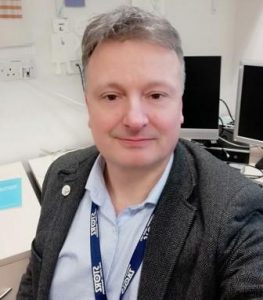Amazing research Carried out by Mr Tamas Cserni to develop the Puma device. This funding is only possible with the continued support of our wonderful Supporters!
Here is the article published by MFT – https://mft.nhs.uk/rmch/rmch-doctor-invents-device-to-simplify-complex-kidney-surgery/
A new device designed to simplify a difficult kidney operation in children and adults has been invented by a Royal Manchester Children’s Hospital doctor.
The complex procedure, pyelo-ureteral anastomosis, is required when the tube that carries urine from the kidney to the urinary bladder (ureter) becomes blocked. The blocked part of the tube must be removed, and the ureter re-joined to the kidney.
Currently, this re-joining can only be achieved via challenging stitching, which makes the minimally-invasive keyhole surgery very difficult. The keyhole technique is so demanding, especially in babies, that only a handful of surgeons are able to offer it to their patients. As such, almost half of the procedures in the UK are done via open surgery; which leaves a bigger scar, has a longer recovery time and a longer stay in hospital. Robot-assisted keyhole surgery is less demanding, but only a few NHS hospitals have the expensive robotic surgical systems required to undertake the procedure.
 Around 50 patients at Royal Manchester Children’s Hospital (RMCH) – part of Manchester University NHS Foundation Trust (MFT) – require the procedure each year, leading Consultant Paediatric Surgeon and Urologist, Mr Tamas Cserni (right), to develop the Pyelo-Ureteral Magnetic Anastomosis (PUMA) device.
Around 50 patients at Royal Manchester Children’s Hospital (RMCH) – part of Manchester University NHS Foundation Trust (MFT) – require the procedure each year, leading Consultant Paediatric Surgeon and Urologist, Mr Tamas Cserni (right), to develop the Pyelo-Ureteral Magnetic Anastomosis (PUMA) device.
Mr Cserni, who is an established researcher and has already delivered successful innovation projects in paediatric surgery, said: “I was thinking about what I could do to make pyelo-ureteral anastomosis simpler, easier and better. We need to make the procedure significantly easier to encourage more and more surgeons to offer keyhole procedure to their patients.”
Building on a concept previously proven in intestinal surgery, PUMA makes use of high-powered magnets rather than stitches to reattach the ureter to the kidney. The magnets stay in place for a period of 10 to 14 days and can then be easily removed without the need for further surgery. Mr Cserni explains more about the procedure and the device in this video.
He built his initial kidney models from balloons and pieces of foam, which were used at a workshop for surgical trainees in 2016, receiving positive feedback. A simulated model of the PUMA was then tested by RMCH consultants, surgical trainees and specialist nurses, whom Mr Cserni credits with providing valuable insight and contributing to its success.
After a rigorous approval process, the device was than tested in a laboratory at the Institute of Surgical Research at Szeged University, Hungary. The results of the simulations and the ‘proof-of-concept study’, which was funded by MFT, have now been published in the British Journal of Urology International.
Earlier this month, PUMA was awarded the Innovation Prize at the virtual British Association of Paediatric Endoscopic Surgeons 2020 Conference.
Supported by MFT’s Innovation Team, the Trust has now filed a UK patent application to protect the device and Mr Cserni has been awarded funds for further development by the Kidneys for Life charity.
“I was very happy to receive the award, and it’s reassuring that a panel of experts agree the results are promising. I’m very grateful for the support I receive from my colleagues at the Urology Department at RMCH, the MFT Innovation Team, the Kidney for Life Charity and the Szeged research team,” said Mr Cserni.
“It is still a long way to trialling the device in humans, but it’s great to know that my colleagues in the field like the idea and think the work so far is promising.”
Dr Katherine Boylan, Head of Innovation at MFT, said: “Congratulations to Mr Cserni on his award win and for developing the PUMA device, which is a fantastic example of the cutting-edge research and innovation we carry out at MFT.
“The MFT Innovation Team is currently helping to identify a commercial partner to bring the device to market. If successfully commercialised, this could result in clinical benefits not just for patients being cared for in our Trust, but for children and adults requiring this surgery across the UK and the World.”







